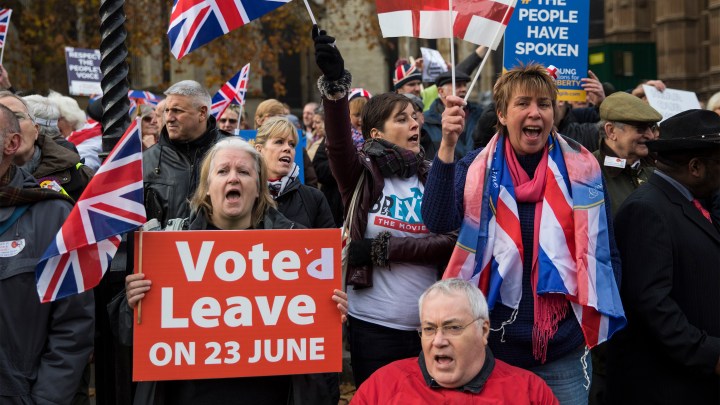
Brexit may force the U.K. to choose between the EU and the U.S.
Brexit may force the U.K. to choose between the EU and the U.S.

Friday Jan. 31 is a big day for the United Kingdom. At 11 p.m. local time, after almost four years of often bitter wrangling and political turmoil, the country formally leaves the European Union.
Big Ben — the famous bell which has rung out across Parliament Square in London for more 160 years and marked numerous state occasions — will be silent at this historic moment.
The bell is out of action due to restoration work on the tower. Brexiteer and lawmaker Mark Francois says the timing is a shame.

“We will take back control of our laws, of our money and our borders, and we will then become an independent nation once again,” Francois told Marketplace.
Twenty thousand revelers are expected at a rally in Parliament Square on the evening of Brexit and there will be many private parties around the country. Francois, for example, says he will celebrate well into the following morning.
“I’m not going to go to bed. I’ve wanted this moment for years and years, so I’m going to stay up and watch the sun rise on a free country,” he said.
Anti-Brexit campaigners, still protesting in Parliament Square, have no such plans.
“I won’t be celebrating,” said Simon Wilks, one of the protesters. “I’ll be going to bed early, I think.”
“I’m feeling distressed and frightened about the future for my children and grandchildren,” said Louise Hummerstone, also at the square, while a third protester, Ruth Fryer, told Marketplace it was “madness for a nation to turn its back on the world’s biggest trading group.”
The U.K. faces stark choices as it embarks on parallel trade talks with the EU and with the U.S. Alistair Carmichael, a lawmaker with the pro-EU Liberal Democrat Party, pointed out that Britain sells more than 40% of its exports to Europe. It’s “obvious,” he said, which way the U.K. should go.

“We have to stay as close as possible in our alignment to our European neighbors with whom we have been part of a union for the past 40 years, and who will remain the most important trading partners that we will have,” Carmichael said.
But Brexiteers like Victoria Hewson of the free-market Institute of Economic Affairs see the EU as a protectionist bloc. Hewson would rather Britain broke free, loosened up, forged a more open trade relationship with America and veered well away from EU rules and regulations — just what the EU doesn’t want.
“They very much fear that if they don’t lock us in, Britain will become more competitive right on their doorstep. So I say, ‘Brilliant! That’s exactly what we wanted,'” Hewson told Marketplace.
If push comes to shove, the U.K. will be making a decision between Europe and the U.S. Marketplace asked a number of passers-by for their views.
“Europe,” replied James Daykin. “Trade will be a lot easier with our closest neighbors.”
“America,” said Mick Orechone. “Because I’m fed up with Europe.” His wife Diana opted for Europe: “It’s the devil we know, really.”
Stewart Bell said that he would choose the U.S. as the main trading partner for the U.K. because “at least we know the Americans are on our side. I just don’t trust the Europeans. As soon as we exercised our democratic right to leave the EU, they turned hostile.”
Still divided over Brexit, the U.K. now faces a daunting deadline. The British government is committed to forging a free trade deal with the EU by the end of this year. That allows just 11 months to hammer out its new relationship with Europe … and with the U.S.
There’s a lot happening in the world. Through it all, Marketplace is here for you.
You rely on Marketplace to break down the world’s events and tell you how it affects you in a fact-based, approachable way. We rely on your financial support to keep making that possible.
Your donation today powers the independent journalism that you rely on. For just $5/month, you can help sustain Marketplace so we can keep reporting on the things that matter to you.












